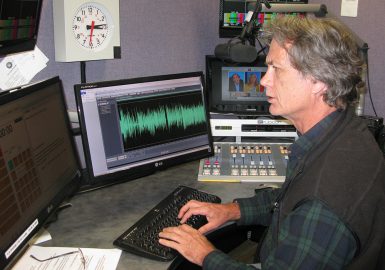Alumnus Pat Piper reminisces about IU experience, radio career

Pat Piper, BA’75, is a self-described radio fanatic. Growing up in Chicago, he tuned in to different broadcasts of the Chicago Blackhawks hockey games from across the country to compare and contrast the coverage. During his years at Indiana University, he and his friends spent all of their time at the student radio station.
Since his graduation, Piper has made a name for himself in national radio. He is currently the executive editor at Westwood One national radio based in Arlington, Virginia, and spent 10 years as a producer on The Larry King Show.
Piper was in Bloomington last week visiting friends and stopped by The Media School to chat with Dean James Shanahan. He also reminisced during an interview about how his IU experience shaped his career.
Piper said he still remembers the first time he heard King on the radio. He was on his way home from covering a city council meeting as the police beat reporter for a radio station in Gary, Indiana. It was 3 a.m. and well below freezing, but Piper stayed in his car outside of his apartment to listen to the entire interview.
“I remember hearing his deep voice and thinking he was faking it,” Piper said of King. “I thought, ‘This guy is full of it.’”
In the late 1970s, Piper found himself working for the Multi Radio Network, the outlet that broadcast The Larry King Show. Eventually he was offered the position of producer, which he was hesitant to take.
“At this point Larry was doing people like Steve Martin, and I was more interested in what was going on in Israel,” said Piper.
Though he had his doubts, Piper stayed with King for 10 years, as they became an efficient team and close friends. Piper said he always was amazed by King’s unique approach to interviewing.
“Larry never wanted to know anything but the basics about the guest,” he said. “He’d tell me, ‘The audience doesn’t know anything about this person, so why should I?’ and he was right.”
In 1998, the pair released a book, Future Talk: Conversations About Tomorrow, a collection of interviews and predictions about what the new millennium would look like. In the process of writing it, Piper interviewed influential people like Bill Gates and Maya Angelou.
Now well into the 21st century, Piper said many of these predictions have come true. One interviewee was concerned that in the future everyone would live in gated communities and never have interactions with people who are different from them.
“The way society consumes news is just like living in a gated community,” said Piper. “Many people don’t listen to or talk to anyone that won’t reaffirm the beliefs they hold.”
Another interview Piper remembers vividly was with Colman McCarthy, founder of the Center for Teaching Peace. The words McCarthy spoke can be applied to the bipartisan divide in media outlets, according to Piper.
“I’m always frustrated when news outlets spread the distrust of other news organizations,” he said. “McCarthy told me, ‘It’s not me against you; it’s us against the problem,’ and I think the news could learn from that.”
This week, Piper has returned to Bloomington to visit with his old friends to do what they’ve always done: talk about radio. Over the years, the group has stayed in touch by emailing each other clips from radio shows to listen to. Recently, they have been convening in Bloomington to discuss their passion in person.
Piper said being back on campus reminds him of the spark that ignited his passion for journalism.
“The first journalism class I took at IU was with (then dean of the School of Journalism) Dr. Richard Gray. He got so wrapped up in his lectures and was so emotional,” said Piper. “I remember thinking at the time, ‘It’s just journalism,’ but now I get where he was coming from.”
Piper has advice for students who are now in that introductory course finding their passion for journalism and hoping for a successful career in the industry.
“Specialization in a medium or a beat is fine, but all journalists should be able to take the audience from point A to point B on almost any subject,” Piper said. “You should know something about everything, but it’s OK to admit you know nothing about something, too.”
In addition to learning a little about a lot, Piper advises students to enjoy their time at IU and feel no need to rush into the professional world.
“Take your time,” he said. “You’ll get there quicker.”

